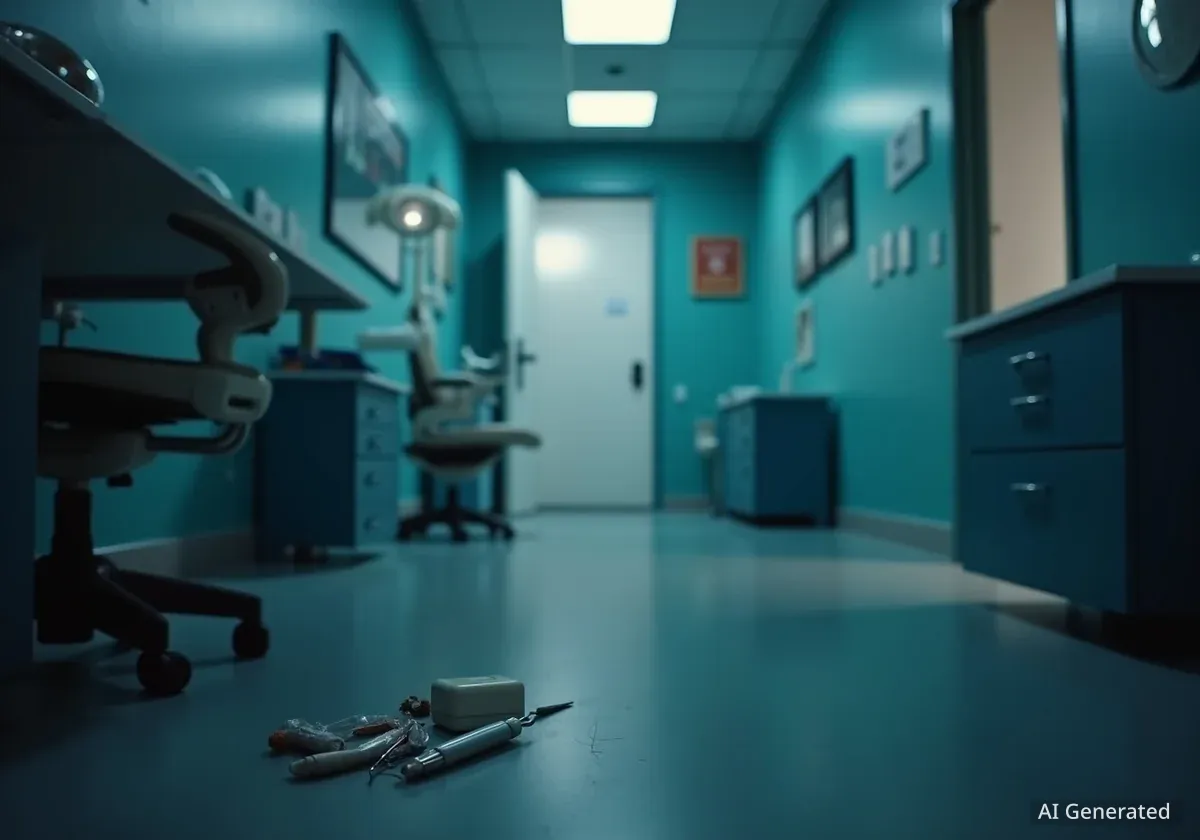A 43-year-old Serbian man has received a prison sentence and a 12-year expulsion from Switzerland for a series of burglaries. He targeted eleven locations, mostly dental clinics, across half of Switzerland. The court in Bern-Mittelland found him guilty of commercial and gang-related theft, property damage, and trespassing. The value of the stolen medical instruments was a key point of contention during the trial.
Key Takeaways
- A Serbian national received a 3-year, 9-month prison sentence and a 12-year expulsion.
- He admitted to eleven burglaries, primarily targeting dental practices.
- The court estimated the stolen goods' value as a high six-figure sum, lower than the prosecution's initial 1.6 million Swiss francs.
- The defendant claimed he sold the items for 80,000 Swiss francs in Serbia.
- DNA evidence linked the accused to one of the crime scenes.
Court Hands Down Sentence and Expulsion
The Regional Court Bern-Mittelland sentenced the man to an unconditional prison term of 3 years and 9 months. In addition, the court ordered his expulsion from Switzerland for 12 years. The verdict is not yet final. The court's assessment of the total value of the stolen goods differed significantly from the prosecution's initial claim.
Prosecutors had alleged that the accused stole equipment and instruments worth 1.6 million Swiss francs across eleven burglaries. Prosecutor Melina Maspero described this amount as an "astronomically high sum." However, the court ultimately determined the value to be a high six-figure amount, considerably less than the prosecution's figure.
"The damage was high. But certainly not that high," stated the 43-year-old defendant, who admitted to the burglaries. "If the material had been worth so much, I would not have had to break in so often."
The accused claimed he sold the stolen items for 80,000 Swiss francs on an online platform for used equipment in Serbia. This large discrepancy in value formed a central part of the legal proceedings.
Fact Check: Value Discrepancy
The prosecution estimated the stolen goods at 1.6 million Swiss francs. The defendant stated he received 80,000 Swiss francs for them. This represents a difference of approximately 1.5 million Swiss francs, highlighting a significant point of disagreement regarding the actual market value of the specialized medical equipment.
Defense Challenges Valuation of Stolen Goods
Defense attorney Ladina Wirthner strongly criticized the prosecution's valuation. She argued that the prosecutor simply adopted the figures provided by the victims without proper verification. Wirthner emphasized that the alleged value of the stolen goods was "many times too high and completely unrealistic." She proposed a maximum value of 200,000 Swiss francs for the items.
Wirthner also pointed out that the lists of stolen items changed and grew longer during the investigation. She questioned how her client could have carried out such a large quantity of material. The defense suggested that some victims might have used the opportunity to upgrade their practices at the expense of insurance companies.
For two of the eleven burglaries, the stolen amounts were small. However, for individual incidents at dental clinics with multiple treatment rooms, victims claimed damages of almost 300,000 Swiss francs each. The defendant expressed remorse for his actions, stating he wanted to help his family, who were facing financial difficulties. He noted that the situation is now more challenging for everyone involved.
Background: Commercial Theft
Commercial theft refers to a pattern of repeated theft offenses committed for financial gain. Gang-related theft implies that the crimes were carried out as part of an organized group. These classifications often lead to more severe penalties under Swiss law.
Prosecution Suspects Organized Scheme
Prosecutor Maspero found it implausible that the defendant only sold the specialized medical equipment online. She suggested that "there are clients for such specific stolen goods," implying the existence of a larger organized network or a specific client for the items. Maspero argued that the defendant deliberately targeted expensive devices and instruments, expecting high profits.
Given the high value of the stolen goods, which she described as a "nearly unparalleled case," the prosecutor had sought a significantly longer prison sentence of 7.5 years. The court, however, did not fully agree with this assessment, even considering a high six-figure sum.
Challenges in Determining True Value
Court President Marko Cesarov acknowledged the difficulty in determining the exact value of the stolen items. He noted that the lists provided by the victims sometimes raised "more questions than answers." Despite inquiries from the prosecutor, victims often failed to submit receipts or other proof of purchase for the stolen equipment.
However, Judge Cesarov confirmed that the defendant, along with a deceased accomplice, took large quantities of goods. He stated that dental practices were specifically targeted for their small, expensive instruments, which promised high profits. The court also noted the defendant's increasing professionalism during the burglary series, indicating he had acquired significant knowledge.
- DNA Evidence: During one burglary, the accused left a DNA trace on a beverage bottle after drinking from a refrigerator. This evidence helped link him to the crime scene.
- Professional Approach: The court observed that the defendant became highly professional in his methods over the course of the burglaries.
Burglary Spree Across Multiple Cantons
The series of burglaries began in 2019. Initially, the defendant and an accomplice committed two break-ins in the western part of Bern. The accomplice was also involved in another burglary in Schaffhausen in 2020. After these initial incidents, the defendant continued his crime spree alone.
His subsequent targets were no longer in the Bern region. Instead, he focused on cantons such as Zurich, Aargau, Schaffhausen, St. Gallen, and Thurgau. The last reported burglary in this series occurred in June 2024 in Zurich. The widespread nature of the crimes indicates a deliberate and organized approach to targeting specific types of establishments across different regions.
Previous Incidents: Dental Clinic Break-ins
In spring 2025, four dental practices in Eastern Switzerland were targeted by burglars within a few weeks. Equipment worth tens of thousands of Swiss francs was stolen. This highlights a recurring pattern of such crimes.
Impact on Dental Sector and Past Trends
The Bern Cantonal Police do not specifically track burglaries in medical or dental practices in their statistics. This makes it difficult to provide precise figures for these types of incidents. However, the Swiss Dental Association (SSO) is aware of these reports and expresses concern.
According to SSO spokesperson Andrea Renggli, the association does not keep statistics on burglaries or damages affecting its members. There is also no central point of contact for affected members. Renggli stated that if burglaries become more frequent, the SSO might consider issuing warnings to its members via a newsletter.
Notable High-Value Thefts
In November 2019, the Dental Medicine Clinic at the University of Bern was affected by a burglary. Thieves stole instruments valued at 400,000 Swiss francs. This theft significantly disrupted the students' teaching schedule. Another highly profitable incident occurred last July at a dental implant manufacturer in Oensingen, where ceramic implants worth approximately one million Swiss francs were stolen.
Historical Context: Large-Scale Burglaries
Between 2006 and 2009, a major series of approximately 120 burglaries targeted medical and dental practices across German-speaking Switzerland. The total value of the stolen goods in that extensive series exceeded 10 million Swiss francs. This demonstrates that large-scale theft from medical facilities is not a new phenomenon in the region.




